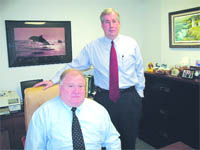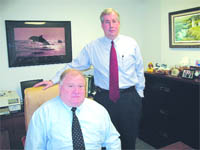
Choppy Waters
Pension and Benefits Associates Helps Employers Navigate Challenges

Bruce MacDonald (left) and Mark Shea say the world of health insurance and employee retirement plans is much more complex than it was a decade ago.
Mark Shea says he has always strived to provide two things to clients: knowledge and responsiveness. At a time he refers to as an unprecedented awakening of America, both services are more needed than ever.
As owner of Pension and Benefits Associates Inc. in Springfield, Shea works with area employers to craft benefit programs, including retirement plans. And these days, the picture on the street isnt pretty. Retirement accounts lost some $2 trillion in value between the summer of 2007 and October 2008, which has not only hampered families abilities to make major purchases, but in many cases is making delayed retirement a real possibility for some.
The awakening Shea refers to is the fact that most American workers are realizing for the first time the full implications of the 401(k) age specifically, the fact that they shoulder all the risk in their retirement accounts, a situation that most workers of 20 years ago would have found strange, to say the least. And that risk has hit home in a major way.
Twenty years ago, the way pension plans worked was, you worked 30 years, then got a check in your mailbox, Shea said. But the promise of working 30 years for a company and getting a guaranteed retirement check its gone.
In the past, a company would provide a pension benefit of X dollars per month, he continued. The new paradigm is, well sponsor a 401(k) plan. We may have a match, we may have a company deposit, but were not making any promises.
In other words, theres no safety net, at least in the short run, for workers who have seen, say, a 401(k) account worth $150,000 fall into the high five figures within a years time.
In the old days, a company took care of everything: your health plan, your disability plan. They werent asking people to pay more for this, more for that, Shea said. Now, people are saying, I want to stop the pain; put me in a money-market account. The volatility is gut-wrenching.
Evolving Story
The old pension system, Shea told BusinessWest, is simply not cost-effective for todays employers in the vast majority of cases, partly due to gradual changes in the tax code for businesses. The dominance of 401(k) plans, which began in the 1980s, has injected an element of uncertainty into retirement plans that didnt exist for most retirees of past generations. Its not some employer plot, he said. Its an evolution.
Its also quite a change from what the experience of Sheas own parents, both of whom, after retirement, started receiving a set amount of money each month that never varied; they could plan for their needs because they knew how much money would be available at any given time.
Under the old pension plans, the employer absorbs the market risk, he said. It could be good for them, and it could be bad. But in a 401(k) account, you put X amount of money in the cookie jar, and it goes up and down based on what the market is doing.
Back then, if there was underfunding, the company would have to put more dollars in, he continued. Today, people are at or near retirement, and they may have 30% less in their retirement account, and theyre sick over it.
Shea understands the long-term picture better than most, as the third owner, since 1998, of a business that began 63 years ago.
Today, three separate entities operate under the Pension and Benefits Associates umbrella. Shea handles employee benefits, including group life insurance, medical disability, retirement, and executive compensation. Bruce MacDonald is president of Dependable Benefits Management, which focuses on medical, dental, group life, and disability coverage, among other services, while Gregory Sheehan heads Sheehan Financial, offering wealth-management services to individuals.
All have seen dramatic shifts in their respective fields. For example, MacDonald noted how cafeteria plans have allowed companies to offer benefits to workers who would not have received them in the past.
They may also have a very transient workforce, a very large part-time workforce, he said. Benefits are typically provided to people who work full-time more than 30 hours a week, or in some cases 20. But a lot of firms have people who work steadily but at fewer hours than that. Voluntary plans provide the ability to obtain benefits in a cost-effective manner, because its billed on a group basis.
Employers also offer post-retirement health benefits far less often than they used to, Shea noted.
People in their 60s cant retire because they need health insurance, he said, adding that those fortunate enough to retire from companies that provide such continued coverage benefit in more ways than one. He cited one of his own employees around that age who was already covered by his former employer when he sought a job working for Shea.
That person has more employability than if youre looking at a candidate whos 61 years old, and to whom you have to provide health insurance, he said. That age demographic is going to kill me.
Instant Access
But the biggest change, obviously, has been the dramatic devaluation of retirement accounts. Financial crises always seem to bring out political teeth-gnashing, and theres certainly plenty of that going on these days.
Unlike Wall Street executives, Americas families dont have a golden parachute to fall back on, U.S. Rep. George Miller, D-Calif., said recently, as quoted by the Associated Press. Its clear that their retirement security may be one of the greatest casualties of this financial crisis.
Of course, all this is happening during an age of instant online information, which poses its own challenges.
We have 24/7 access, Shea said. You can go on the Internet, you can pull up a graph, you can look at it daily basically, you can drive yourself crazy. Fifteen, 20 years ago, before everyone had a PC on their desktop, before we all had the Internet, employees would get a retirement statement maybe once a year and say, oh, thats nice. There was no instantaneous information. Today, were bombarding people with connectivity, and thats both good and bad.
One negative is the immediate urge to get out of the market, said MacDonald, but that would be the wrong strategy, especially for those who wont retire for some time, or who dont need all their invested money right away.
Youre putting a lot of personal money into these programs, but I think its safe over the long term, he said. Historically, weve had ups and downs. This year was historic, and theres a tendency to pull back. But this is not the time to stop. This is the time to double up. Everything is on sale now. Its almost like saying, I want to wait until were paying full price again for me to get back in.
My outlook? Shea said. Things go down, but I think things will come back up. I have a positive outlook over the long run.
Joseph Bednar can be reached at[email protected]




